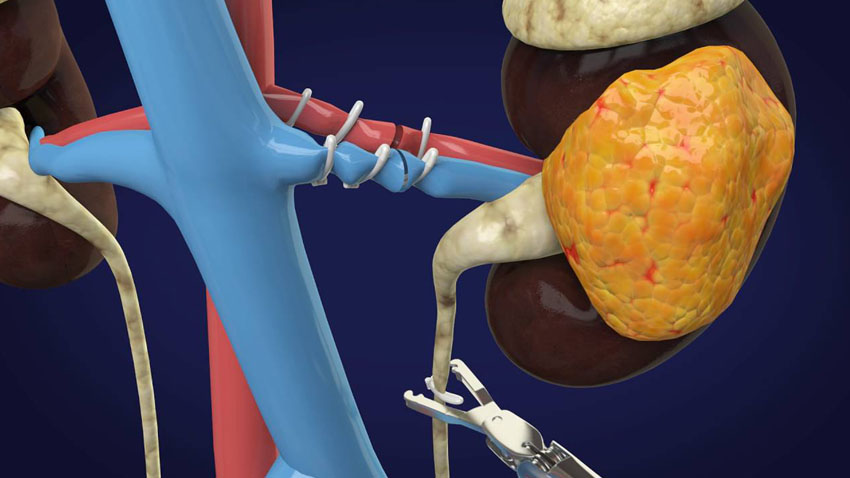Radical Nephrectomy is a procedure done for the treatment of kidney cancer. During the surgery, the entire kidney is removed along with the surrounding adrenal glands and the lymph nodes. Radical Nephrectomy surgery requires two to four hours, depending upon the type of surgery performed, whether full or partial Nephrectomy. The recovery time of the surgery is 3 to 6 weeks.
Overview
Radical Nephrectomy is a procedure used by a urologist to remove the whole of your kidney. This is done for the treatment of kidney cancer, in which the surrounding lymph nodes and the adrenal gland are often removed as well to prevent spreading of cancer. Most patients do fine with one kidney that is left after the surgery.
There are two types of radical nephrectomy procedures- partial and complete nephrectomy. Complete nephrectomy is the removal of the entire kidney, while partial nephrectomy is the removal of only diseased tissues from the kidney, leaving the healthy ones.
In a donor nephrectomy, the healthy kidney is removed from the donor person for a healthy kidney transplant into a recipient’s body. Kidney cancer in adults begins in the cells within the small tubes inside the kidneys. On the other hand, kidney cancer in children is likely to develop due to poor growth of kidney cells. There are certain factors determining how much kidney tissues are removed:
- How far cancer has spread in the kidney
- How the kidney functions
- Whether there is a tumour inside the kidney or not
- Are there more than one tumour
- Has the cancer spread to the nearby tissues
Urology doctors make a decision based upon the patient’s screening and testing results. For instance, an ultrasound helps to produce images of the soft tissues inside the kidney and how far they are affected.
Computerized tomography, is yet another specialized X-ray technology that offers thin cross-sectional views of the kidney’s soft tissues. Doctors use another technique, resonance imaging, for producing 3D images of the kidneys and the surrounding areas.
Treatment options like radical and partial nephrectomy help to remove scarred, non-functioning and severely damaged kidney tissues. Receiving a healthy person’s (donor’s) kidney is another treatment alternative.
Before you undergo radical nephrectomy procedure, these are the preparations you need to take.
Before the treatment
- You are required to undergo several types of screenings and testing procedures to help your doctor evaluate the condition of your kidney and whether you have any other health issues.
- Based upon the test results, the doctors determine whether you need a radical or partial nephrectomy and whether there are any other alternative treatment options.
- Discuss with your urologist regarding the treatment you are going to receive, the recovery time required and how long you will have to stay in the hospital.
- Your doctor will instruct to stop taking certain medications (like blood thinners, etc). He may suggest you to take some new medications as required for the surgery.
- You are required to start fasting from the midnight till the day of the surgery. Make sure you take only those medicines as suggested by your doctor on the day of surgery with a small sip of water.
How it is performed
- Before the operation, you are given general anaesthesia to let you sleep through it. A catheter is placed in your bladder to help in drainage.
- In case of an open radical nephrectomy, a large incision is done in the patient’s abdomen, lower back and side to get access to the kidney. Another cut is done across the side, below the rib cage to allow surgeons examine the surrounding tissues and lymph nodes and whether the cancer has spread further. The operation takes two hours to complete.
- On the other hand, a laparoscopic radical nephrectomy takes much lesser time that uses a minimally invasive procedure. Several “key-hole” incisions are done in the abdominal cavity through which a laparoscope (with camera fitted to its end) and other surgical instruments are inserted to perform the surgery. The laparoscopic procedure is used for removing smaller and localized renal tumours.
In contrast to a open radical nephrectomy, laparoscopic procedure has more benefits that involve shorter hospital stay, lesser pain and quicker recovery.
Recovery
After the surgery, you are transferred to the recovery room where you are monitored for blood pressure, respiration and pulse rate. Some patients are transferred to the Intensive Care Unit in case complications show up. Pain killers are given to help you get relief from uneasiness.
It is normal to not have bowel movements for several days after the operation. Patients are generally suggested to have laxatives and other stool softeners. Follow-up appointments with your urology doctor are necessary to ensure you are doing well after the surgery and that the cancer has not returned. The total recovery time of radical nephrectomy takes around 3-6 weeks, while period is much shorter in case of a laparoscopic procedure.
To ensure faster recovery, listen to every details of your doctor’s advice. Include lots of fibre-rich foods and liquids in your diet, but only after 2-3 days after the surgery. Refrain from heavy lifting jobs and strenuous activities. In case of any complications like swelling or bleeding of the wound, report it to your doctor without delay.






Leave A Comment
You must be logged in to post a comment.